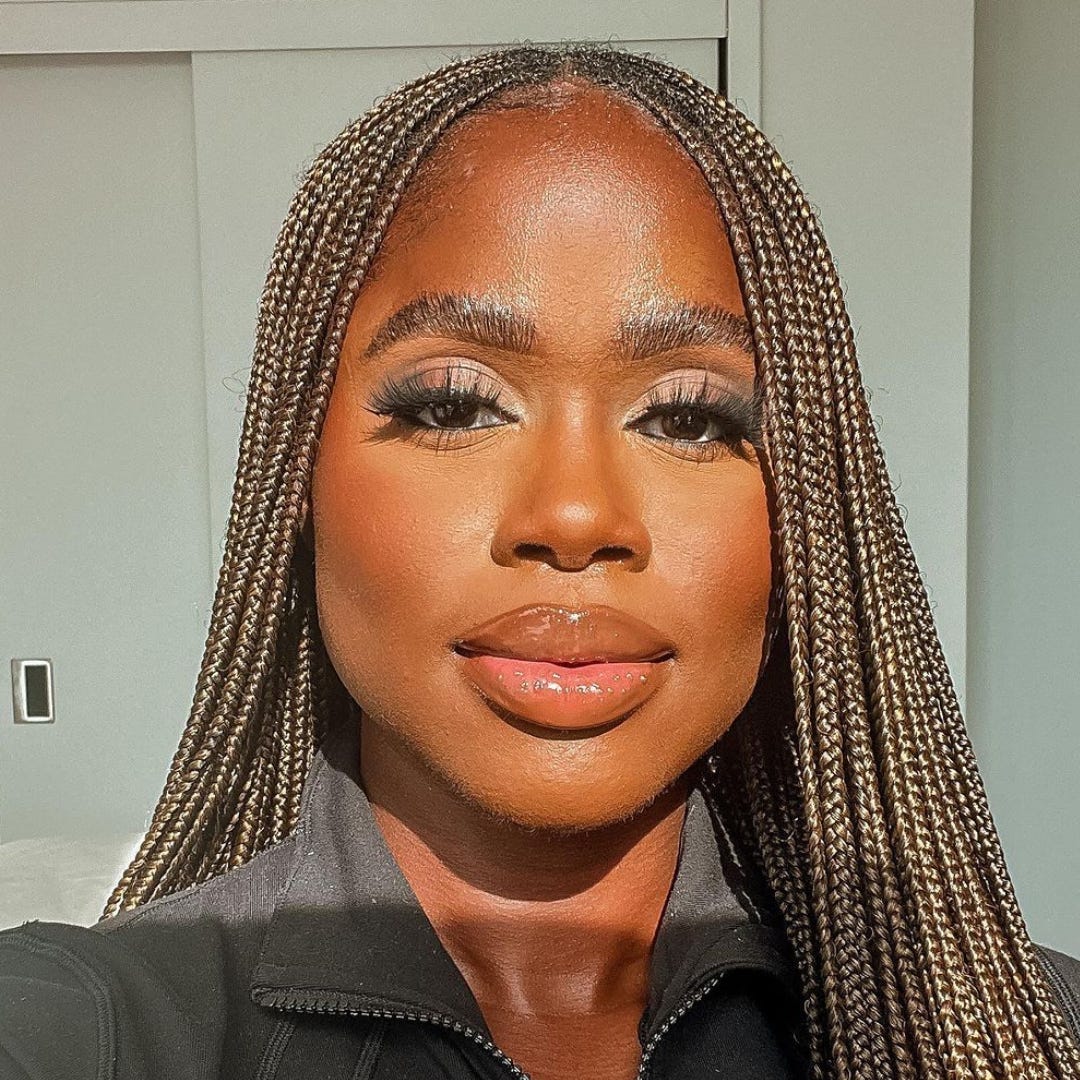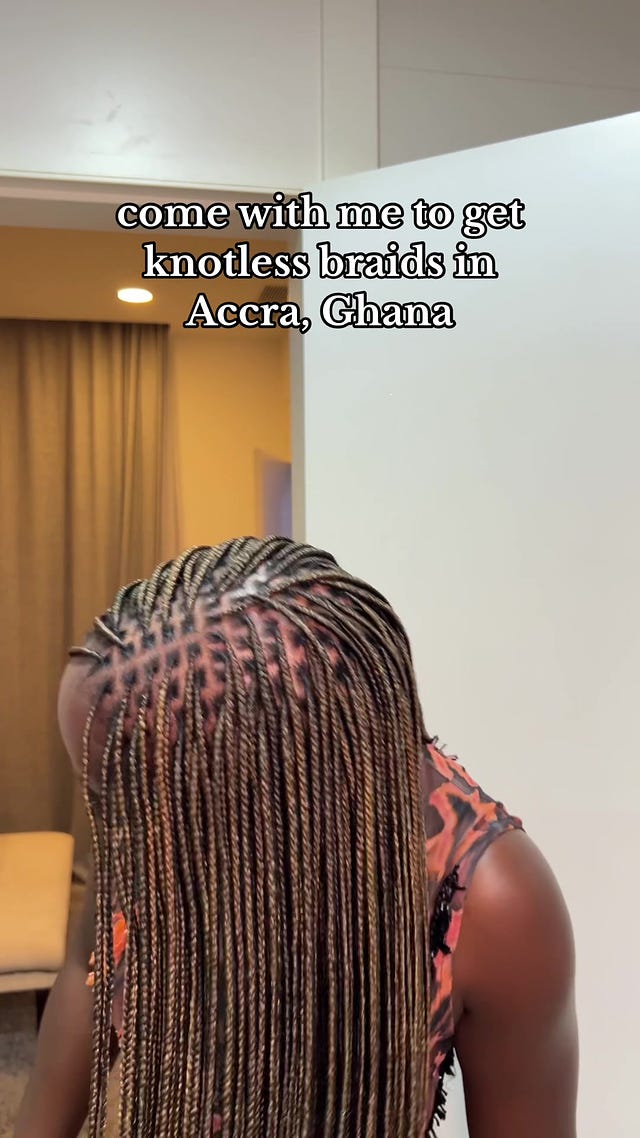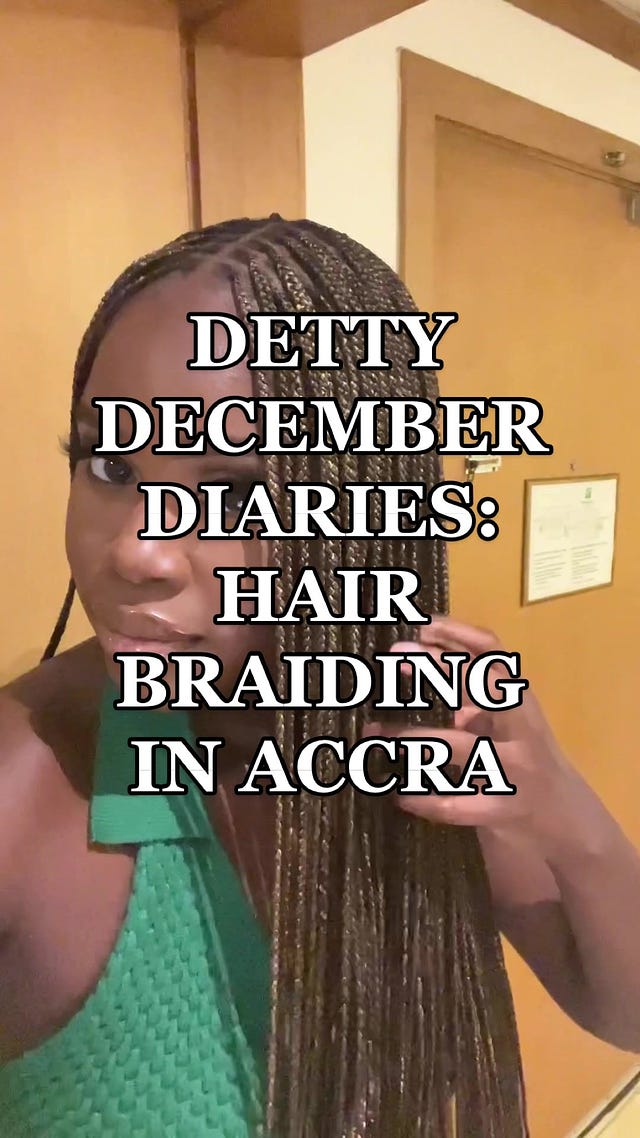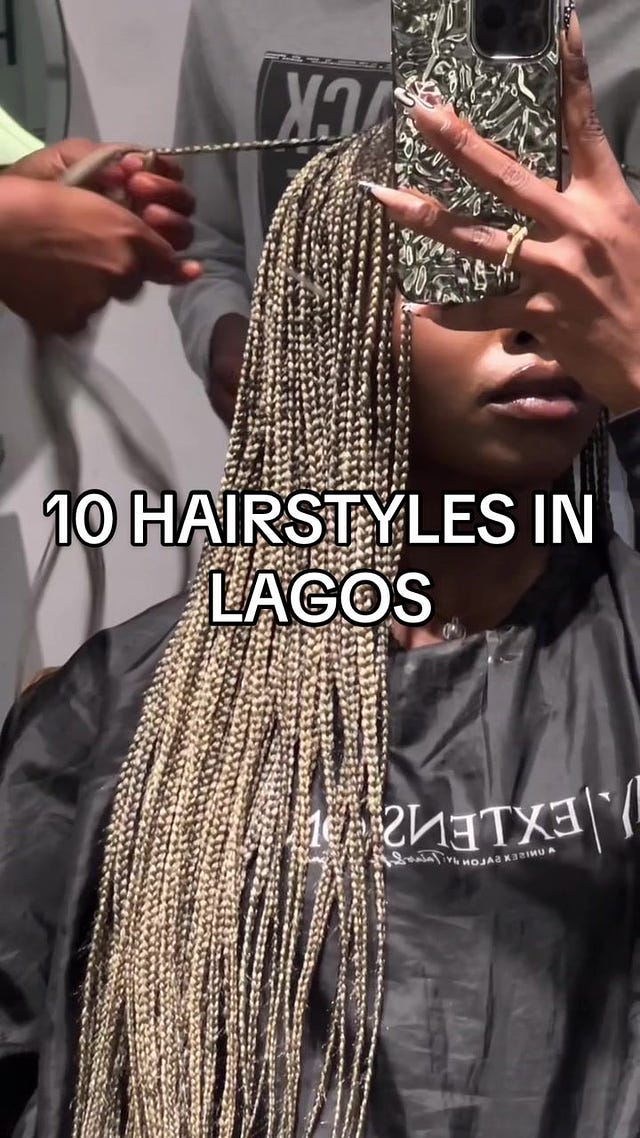The Annual "Detty December" Bussdown is Back
Braids, microlocs, and exploring beauty tourism in Africa.
Can you believe it’s already mid-November? The holiday season is almost here, which means Detty December is right around the corner. If you haven’t booked your hair appointment yet in Lagos or Accra, sorry to say—it’s probably too late to snag a spot at the hottest salons.

What is Detty December?
If you’re Nigerian (or just tapped into West African culture), you’ve likely heard of or experienced Detty December at least once in your mid-twenties or you’ve seen highlights on social media.
Detty December is a festive period that runs from mid-December through New Years, when there are parties, social gatherings, and celebrations in West Africa, predominantly in Nigeria and Ghana.
The buzz around Detty December really took off in 2019, following the Year of Return initiative by the Ghanaian government, which encouraged Africans and Black Americans in the diaspora to reconnect with the continent.
One trend that’s become synonymous with the season? Getting your hair done. Whether it’s braids, Sisterlocks, microloc extensions, or other styles, women are booking appointments as soon as they land in Africa—or right before they head back to the U.S. Why? The cost. While a fresh set of knotless braids or boho braids might set you back $250+ USD at home, you can snag the same style for under $50 USD in many African cities.
This trend has sparked a debate about its ethics, and that's exactly what this post aims to explore.
Is Beauty Tourism in Africa Exploitation or Opportunity?
I’ve been thinking a lot about beauty tourism in Africa lately, especially after diving into the topic over the past couple of years. What really sparked this piece was a post I stumbled upon on the BlackBeautyPop Substack by Ash T. called, “Is It Giving Exploitation?” While she touches on a similar question, the post leaves things unresolved. I wanted to jump in and add my perspective because, to me, this conversation is far more nuanced than it seems at first glance.
In her post, Ash T. highlights a video by content creator Crystal, who reveals she flew all the way to Nigeria from the U.S. just for a one-day hair appointment, citing the lower cost as her main reason. This sparked outrage among her audience, who couldn’t understand the logic when you factor in the cost of the flight, accommodations, and other expenses. In response, another creator, Joy, argued that this kind of beauty tourism mirrors corporate outsourcing—where businesses exploit countries with fewer labor protections and cheap wages, essentially devaluing workers’ labor. In her view, this is a form of oppression.
While some might view this behavior as exploitative, I’m hesitant to use that term. “Exploitation” implies something unethical or unjust, like taking advantage of a vulnerable situation. To me, though, this feels more like arbitrage—capitalizing on price differences in a way that isn’t inherently harmful. Let me break it down with a few examples.
Braids, Sun, and Savings: Beauty Creators Spill the Tea on Getting Braids in Africa
After Detty December, beauty creators flood social media with videos showcasing their "homegoing braids.” In one popular TikTok from 2023, Eni takes us behind the scenes of her annual trip to Adora Beauty Salon in Ghana, where she gets her custom blend of flawless, small, waist-length knotless braids for the third year in a row. She books months in advance, and, grateful for the warm hospitality, she arrives with gifts for the stylists. Back in the U.S., this style would easily cost $500 to $1,000, but in Ghana, she pays a fraction of that price. In fact, the salon owner waived the fee for the service, recognizing the business boost they’ve received through her content. Still, Eni tips generously—1,000 GHS (roughly $83 USD)—out of appreciation.
In a similar video from 2022, Eni paid 700 GHS ($72 USD) for the braids, plus a 100% tip, bringing her total to $154. While the final amount was higher than the local market rate, it was still far less than what she would have paid for the same style in the U.S.
The comments on her video were overwhelmingly positive, with viewers praising the quality of the braids and asking for contact details to book their own appointments. A few even applauded Eni for her generous tipping.
In a more extreme example, TikTok creator Lexi documents her journey of getting ten different hairstyles in Lagos over eight weeks, admitting that she “had to take advantage” of the low cost of services. From ponytails to multiple sets of knotless braids, Lexi went all in. At one salon, noticing the workers were exhausted from the long hours, she bought them lunch. Comments on her video were mixed—some viewers were baffled by the idea of subjecting both her scalp and the workers to such intense scheduling, while others suggested it was all for "content." Despite the mixed reactions, Lexi paid around $1,000 USD for the entire eight-week hair marathon—significantly less than what she would have spent in the U.S.
Microlocs Made on the Motherland: Traveling to Lagos, Nigeria to Install My Locs
Speaking from my own experience, back in March of 2024, I did something that might sound unbelievable: I traveled all the way to Lagos, Nigeria just to get my microlocs installed. And even after factoring in the cost of my flight and the service itself, it still ended up being cheaper than starting my locs in New York. Seriously. I even used credit card points to cover part of my flight, which made the overall cost even lower. On top of that, I turned it into a mini vacation—reconnecting with family, soaking up the African sun, and indulging in all the suya, jollof, and plantain I could eat (because let's be real, suya on the continent is unmatched). #IYKYK.
The thought of paying $2,000+ USD for a hairstyle that would take 2-3 days to install in New York just didn’t sit right with me—especially when I could get the same (if not better) quality service, a faster turnaround, and a more enriching experience abroad, for a fraction of the price.

These creators and I aren’t the first, and certainly won’t be the last, to take advantage of the cost differences between getting their hair done at home versus on the continent.
But personally, I don’t see this as unethical. In fact, I believe it can actually be a win-win—benefiting both the client and the businesses abroad.
Why Beauty Tourism Can Be a Win-Win for Everyone Involved
When discussing the ethics of beauty tourism, it’s important to remember that monetary value is a social construct—something that becomes "real" through collective agreement. This means the price of goods and services isn’t universal; it varies from country to country. The U.S. is not the global benchmark. As long as hair braiders, locticians, and stylists are treated fairly, paid appropriately, and not overworked, I don’t believe these practices are inherently unethical or exploitative of “cheap labor.”
In some African countries, there are high levels of unemployment and an oversupply of low-skilled labor, like hairstyling, that doesn’t always meet local demand. This imbalance can actually make beauty tourism a source of economic opportunity, helping people earn a living wage that they might not otherwise have access to.
When it comes to hair braiding for example, from what I’ve observed, the oversupply of labor in some salons actually works in favor of the stylists. They often staff multiple people per client to boost time efficiency, allowing them to do less individual labor while still maintaining high output. In many cases, salons charge an additional fee per extra stylist, compensating for the added resources and the convenience of getting the work done more quickly. This setup helps ensure the stylists are fairly compensated without overworking anyone.
As long as serving foreign clients doesn’t prevent salons from also taking care of their local customers, I don’t see an issue. For me, the real concern arises when foreign clients, with their ability to pay higher prices due to currency exchange benefits, start "buying out" appointment slots, making it harder for locals to book. This could create an imbalance where local clients are priced out or have to wait longer for services, which is definitely something to be mindful of.
I also recognize that I’m writing this post from a place of privilege, as not everyone has the ability to travel freely for beauty services. But, for those who feel morally conflicted about benefiting from the value of labor, there are ways to approach beauty tourism with mindfulness and respect, ensuring a positive experience for everyone involved:
Treat the workers with kindness and respect. This should go without saying, but it’s crucial to make sure the people working on your hair feel valued.
Express your preferences. If you’d prefer not to have someone too young or inexperienced styling your hair, don’t hesitate to share your concerns with the salon owner.
Offer to buy lunch. If it’s allowed, consider buying the stylist’s lunch during the service as a gesture of appreciation.
Tip well. If you’re in a position to do so, a generous tip shows you value their work.
Pay the "U.S. client rate" without haggling. While they may give you a rate that’s slightly higher than the local price, it will still likely be cheaper than what you’d pay in the U.S. So, accept the premium and don’t haggle over pennies.
Showcase their work. After your trip, post a photo of your styled hair on social media and tag the salon (if you're happy with the results). Word-of-mouth referrals go a long way, and sharing your experience can help bring them future business.
When done thoughtfully, this type of tourism can create employment opportunities abroad, while supporting the local economy in a positive and sustainable way. I think it’s time we broaden this conversation. With so many people traveling to Asia, Europe, and South America for beauty and medical tourism, it’s worth asking: why shouldn’t Africa benefit from this too?
What do you think about this growing phenomenon? Drop your thoughts in the comments!









